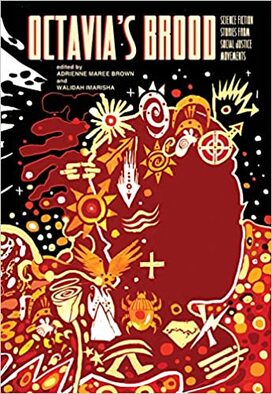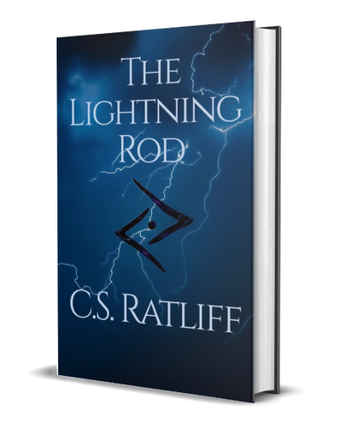And amplify a sense by a factor of ten...hmmmm. I would say sight because my vision suuucks, so amplifying it by a factor of ten would probably just about give me normal vision, yay! In all seriousness, yes, I’d say sight. I feel like all the other senses being amplified would be really rough in different ways. I love both Sci-Fi and Fantasy in all their forms. However, I sometimes wonder why they are grouped together as, for me, they seem distinct in many ways. As a writer of sci-fi and fantasy yourself, how do you distinguish the two genres? Can there be any crossover? Should they be considered separately or are they just two ends of the same spectrum? That’s a really great point, and it’s a pretty big part of my concentration. For my major, I chose to study The Concept of Otherness in Speculative Fiction, and one of the things I talked about a lot with my adviser was the use of the term “speculative fiction” instead of “science fiction” or “fantasy.” For me, speculative fiction means anything that lets the writer make observations about the human condition, society, technology, or really anything, without setting the story in our own world. I would say that sci-fi and fantasy have always been grouped together because they take issues that exist in the here and now and comment on them through creating these other worlds, whether those worlds involve magic and whimsy or tech and innovation. For that reason, I see them as two ends of the same spectrum working towards a similar goal. And as for whether there can be any crossover, my WIP merges magic and technology because I love both genres so much. Whether that crossover is effective is up for debate, but I enjoy it and always look out for it to read! "I chose to study The Concept of Otherness in Speculative Fiction, and one of the things I talked about a lot with my adviser was the use of the term 'speculative fiction' instead of 'science fiction' or 'fantasy.' " You host the online journal Satyr Central which posts “anything soulful and non-conformist”; I personally find this focus so refreshing as almost every publication I have encountered is looking for something so specific that it seems that all but a dozen people on earth are disqualified from submitting. What have been some of the highlights of hosting Satyr Central? Thank you so much! That means a lot to me. And shoutout to one of our editors, “Jon the Semite” for coming up with that little blurb on our About page. I think the biggest highlight of hosting Satyr Central is knowing that I can post some really weird stuff and not worry about “Oh, does this meet guidelines? Oh, is this too weird to publish?” I’ve accepted some great submissions where the authors told me when they submitted that they weren’t sure what category the piece fit into, so they thought it would work well with us, and it did! From theological rants to odes to headless women to articles rating books by how nice they feel and sound, we’ve got some bizarre stuff on Satyr, and I say that with a lot of pride. "From theological rants to odes to headless women to articles rating books by how nice they feel and sound, we’ve got some bizarre stuff on Satyr, and I say that with a lot of pride." Most writers spend a fair amount of time sending queries and submissions. You have experience on both sides of that conversation. As someone who receives and reviews submissions, what are some tips you have for writers who are trying to get their work published?
Other than that, the biggest tip I can give writers looking to submit anything--whether it’s queries for a book, article, short story, poem, whatever--is that it’s a good idea to (politely) follow up if we take too long to look at your submission and get back to you. I love getting submissions, but with everything going on, it’s very easy to get overwhelmed and I always appreciate someone giving me a gentle nudge and saying, “Hey, I sent you this a few weeks ago and just wanted to confirm that you got it.” Now note that some publications/publishers/lit agents don’t like it when you do that and will say that they’ll get to you when they get to you or to take no response as a rejection, and that’s where reading guidelines carefully comes back into play. But for me personally, I appreciate those quick nudges and it’s helped me get back to awesome writers whose submissions I somehow managed to entirely miss. So there’s that! "...the biggest tip I can give writers looking to submit anything... is that it’s a good idea to (politely) follow up if we take too long to look at your submission and get back to you." Sci-Fi and Fantasy as genres offer writers almost unlimited freedom in creating worlds and characters. As always, in the words of Uncle Ben, ‘with great power comes great responsibility’. What are your thoughts on the power of that freedom and what do you think should guide writers in their use of that power? Are there any limits? And where have you seen this power wielded masterfully for the greater good?
"I do think the best stories—Sci-Fi and Fantasy in particular—have the power to You and I share an interest in myths and mythology. One of the joys of engaging with the writing community online is the opportunity to learn about myths from all over the world. Which is your personal favorite flavor of mythology and are there any mythological personalities that you think deserve more air time? Wow, this is a great question (and a tough one!). I grew up on Greek mythology and have always loved it, but in terms of mythological personalities that don’t get enough air time, I’d have to say the legends from The Ramayana. I got to be a student mentor teaching a high school class this Hindu epic, and it was such a joy to explore all of the themes, characters, and political and religious context for the story of Rama, Sita, and Lakshmana. Yet I had never, ever heard of the epic before being invited to take part in that program. I think that’s a real shame and I highly recommend that any lovers of mythology check it out. "I grew up on Greek mythology and have always loved it, but in terms of mythological personalities that don’t get enough air time, I’d have to say the legends from The Ramayana." Can you give us a hint about your current project? Any tantalizing clues or sneak-peek quotes? I’m planning on finishing my first short story from my work-in-progress, which will hopefully be the start of some sort of web series I can post on my website. I want to hold myself accountable because I’m a chronic procrastinator, so I’d love to include the first paragraph from the short story! “It had been two years since the first time Kamiel had been to the Hex Market on the border between his home district and the worst, most loathsome district in The Core City. Since then, he’d gotten accustomed to the hushed conversations, the shifty-eyed patrons, the bubbling of Imaginate elixirs used for something far different and more sinister than their intended purpose, and even the occasional Rending when tensions were high and fights would break out...” Fingers crossed I can actually finish it, ha! “It had been two years since the first time Kamiel had been to the Hex Market on the border between his home district and the worst, most loathsome district in The Core City..." Where can readers keep track of your latest writings and stay up to date on your next publication? I am all over social media, but the best way to keep up with my writing is to subscribe to my blog’s newsletter! I promise we don’t send hundreds of emails a day, but you will get an update when we have a newsletter out or a brand new post weekly.
1 Comment
I set up a certain time frame, in which I’d like to be done writing. After creating a detailed outline I can break it down easier. It helps me figure out how much I need to write each week to reach my goal! "For a writing retreat, I’d love to go to The Black Forest." I often hear writers complain that they don’t want to waste their time on social media. Personally, I have sparked many meaningful connections within the writing community online and have received much in the way of encouragement from this network of fellow writers. As you have found success in attracting a large audience online, what justification would you present to writers who are skeptical about the usefulness of social media? I think anyone that has the opportunity to converse with, or learn from, other writers and authors, as well as spread the word about their work, should take that chance. You never know when that big break will come! Before I wrote The Gatewatch, most of my writing took the form of song lyrics which I sang and performed with a Celtic folk music group. You have a musical background as a vocalist in the hard rock genre. How do your experiences in music shape your stories and what do you think other writers could learn from musicians? I’ve been a musician for over 10 years now. People often feel moved by music, whether it’s the lyrics or the sound. I think metaphors are a big reason for that. Novels can have that same effect. "People often feel moved by music, whether it’s the lyrics or the sound. My stories are primarily inspired by the Norse Myths and I often find myself going back to source material to pick up small details about minor characters that I missed before. Most memorable for me are some of the characters that never get mentioned in popular culture, unlike the well-known actors like Thor, Odin, and Freya. I think a similar phenomenon happens in representations of Greek Mythology as characters like Zeus, Hermes, and Aphrodite overshadow most others. As your work is inspired in part by Greek Mythology, who do you think of as a figure in the Greek myths that deserves a moment in the spotlight? I think that all deities deserve the spotlight, honestly. There are those shrouded in mystery, and chaos, and so many of them are highly misunderstood. Oh and Hera! Definitely Hera. Looks around the room, nervously, with a forced smile. "There are those shrouded in mystery, and chaos, and so many of them are highly misunderstood.
The fantasy realm of Gnariam that you have created is both deep and wide. I sense a lot of anxiety from new fantasy writers about creating the world in which their stories take place. While I think we can both agree that there is no end to the work a writer could do in crafting their world, where do you think a new writer of fantasy should begin in their world-building process? I absolutely love the world of Gnariam so far. It’s going to continue to grow. I think the best tip I could give is to think of as many things in this world, and write them down. For example: governments, religions, currencies, land masses, creatures, if there is magic or tech, terrains, climate, clothing, technology level, etc. Creating a world that feels tangible is a key to success. "Creating a world that feels tangible is a key to success." Where can readers find more of your work and stay up to date on your latest publications? Discover the realm of Gnariam through C.S. Ratliff's novel The Lightning Rod on Amazon.
|
AuthorJoshua Gillingham is an author, editor, and game designer from Vancouver Island, Canada. Archives
April 2022
Categories
All
|







 RSS Feed
RSS Feed
